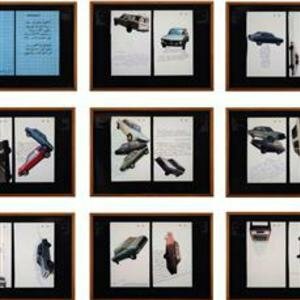


Last updated on Tue 25 June, 2013


Exhibition dates: 25 June — 28 July 2013. Opening for press — 24 June 2013
Venue: Moscow Museum of Modern Art (Gogolevsky Boulevard, 10)
Curator: Olga Shishko (art historian, curator, director and founder of the MediaArtLab, director of the MIFF Media Forum)
Producer: Elena Rumyantseva (programme director of the MIFF Media Forum)
Participants: Harun Farocki, (Germany), Omer Fast (Israel), Milica Tomić (Serbia), Monica Studer and Christoph van den Berg (Switzerland), Walid Ra'ad/ The Atlas Group, USA—Lebanon), “Janez Janša” (Slovenia), Nonny de la Peña and Peggy Weil (USA), Dmitriy Venkov (Russia), Dina Karaman (Russia), Roman Mokrov (Russia), Jack and Leigh Ruby (Australia), Ranbir Kaleka (India), Vladimir Arkhipov (Russia), Nikolay Onishchenko (Russia).
The third installment in the MIFF Media Forum Expanded Cinema series – Mocumentary: Reality Is Not Enough presents the cutting-edge selection of contemporary art works in the genre formed in-between cinema, video and media art. The exposition curated by Olga Shishko (art director of Moscow Media Forum of MIFF) is compiled of the masterpieces of the modern artists from Russia and abroad, utilizing pseudo documentary and mockumentary strategies in their creative practices. Mocumentary: Reality Is Not Enough poses the question of blurred borders between fiction and reality in the era of media addiction, information pollution and uncritical consumption of data and images.
Mocumentary, a genre long-established and well-known to the audience, gathers significant attention among contemporary artists as an active critical strategy. It first appeared in cinema more than 50 years ago as a one hundred per cent fiction made with accordance to the documentary rules and parameters of the quality historical evidence. Just a well made documentary film, a work of mockumentary contains a story supported by facts, witness interviews, recordings from the scenes, material evidence and expert opinions. But in contrast to the qualitative study characteristic of the documentary film, mockumentary replaces all the elements of the narrative with false or parody to create a comic effect and becomes a false story from beginning to end — events that never happened, fraudulent facts, fake experts and counterfeit records.
Mocumentary: Reality Is Not Enough focuses on application of the mockumentary practices both as a creative technique and as a means to make an artistic statement. In contemporary art the genre provides an opportunity to question the truth behind the visible and the transmitted and to deconstruct established historical paradigms. With the help of fakes and simulations modern artists play out the wide-spread myths, false stereotypes and generally accepted facts. The main goal of the experiment is self-criticizing of the audience, propaganda and misinformation in media, the finer points of the social contract and painful historical experience.
All 20 artists presented in the framework of the Mocumentary: Reality Is Not Enough exhibition work with imperceptible transition from reality to its distorted reflection in the age of television boom of media consumption, as well as the growing passivity of the audience in fact analysis. They represent a critical overview and an active political position, creating the new legends by means of video, editing, special effects, and dramatizations. And in their hands all the tricks of the documentary turn into an unbeatable weapon of art play for rewriting history, exposing the complexes and definitions of pain thresholds of individuals, society, eras and nations. Mocumentary: Reality Is Not Enough displays the cutting-edge contemporary art research in the man's place in history, the substitution of reality by skillfully crafted illusions and the boundaries between the historical and political statement.
Join us in our endless discovery of modern and contemporary Arab art